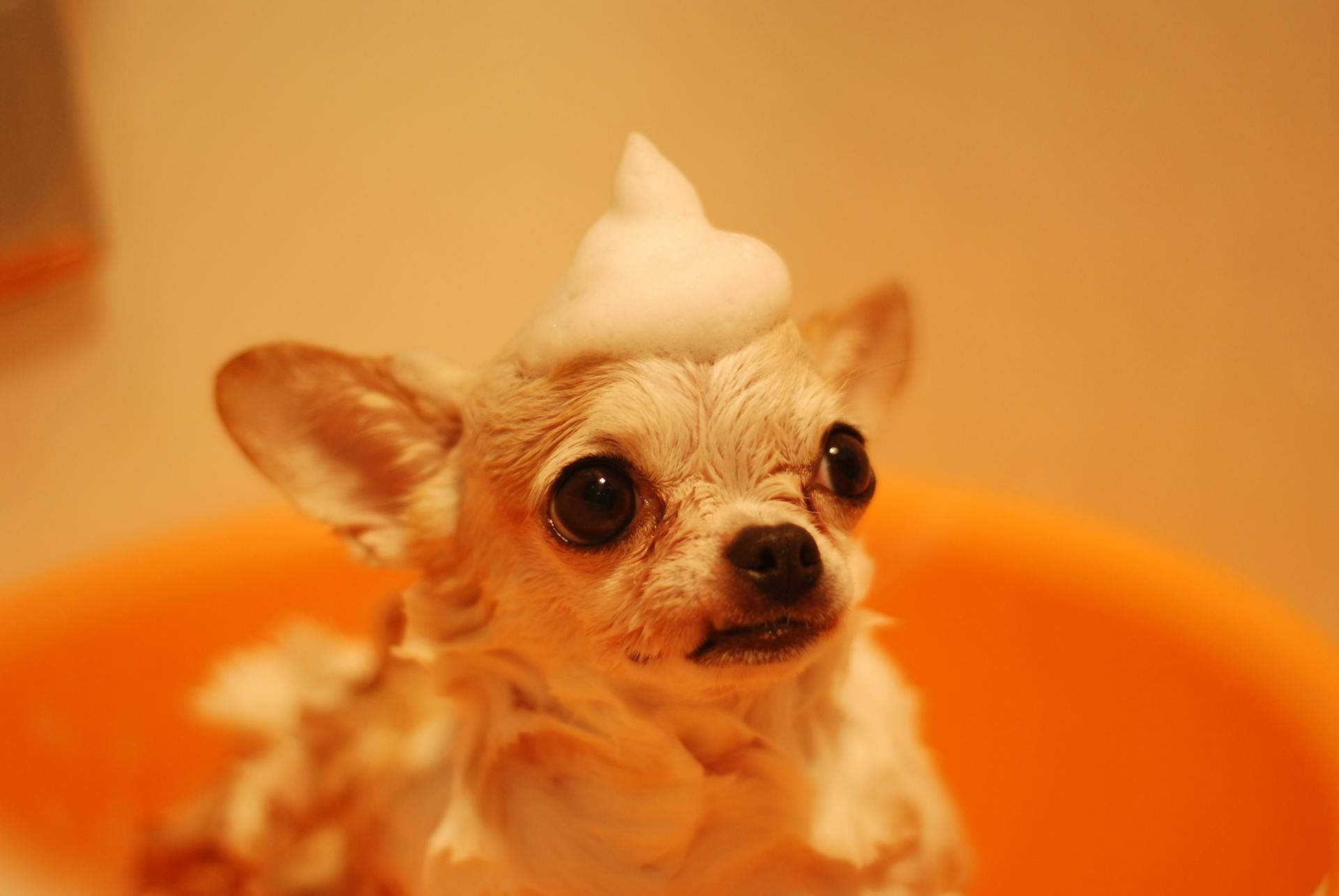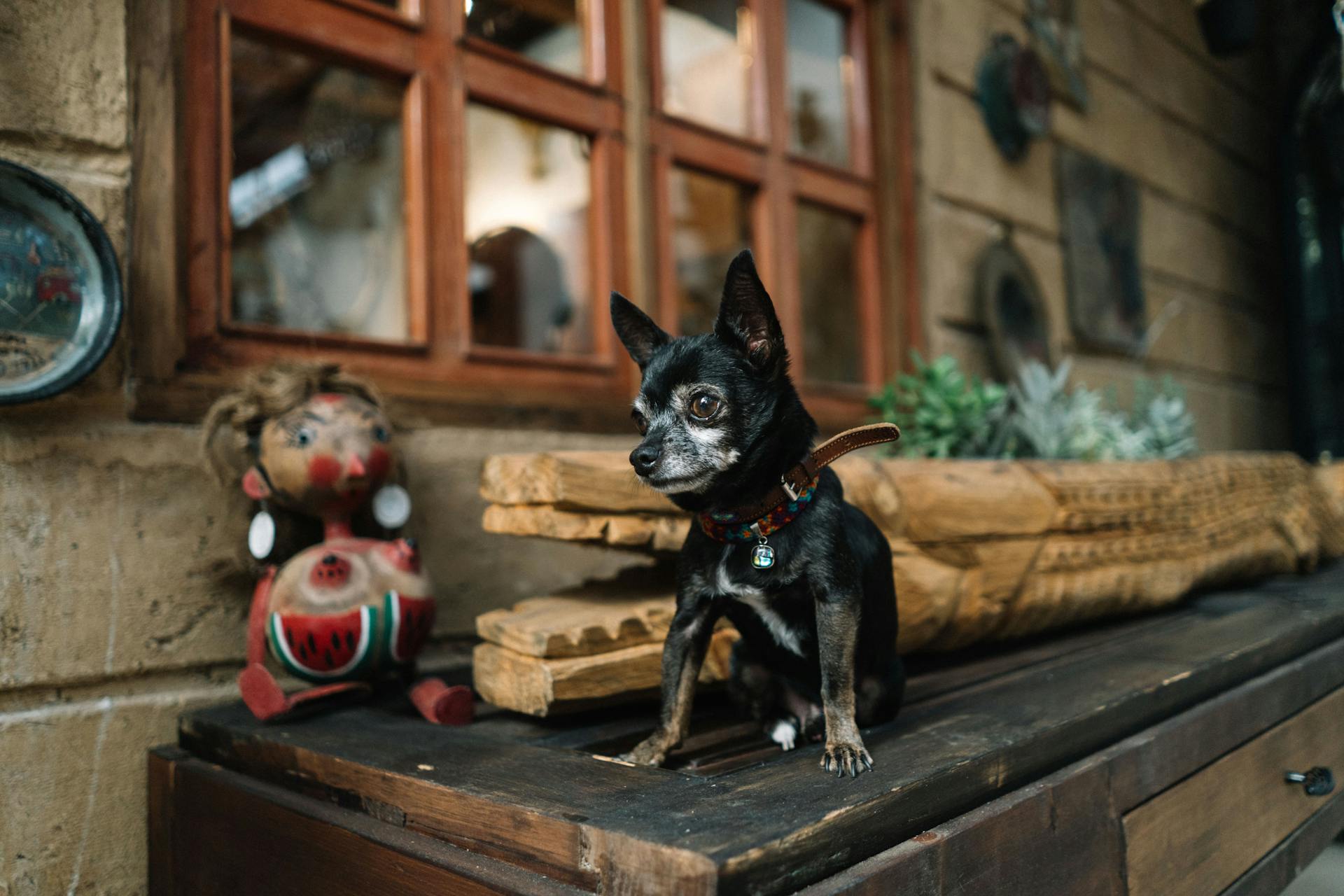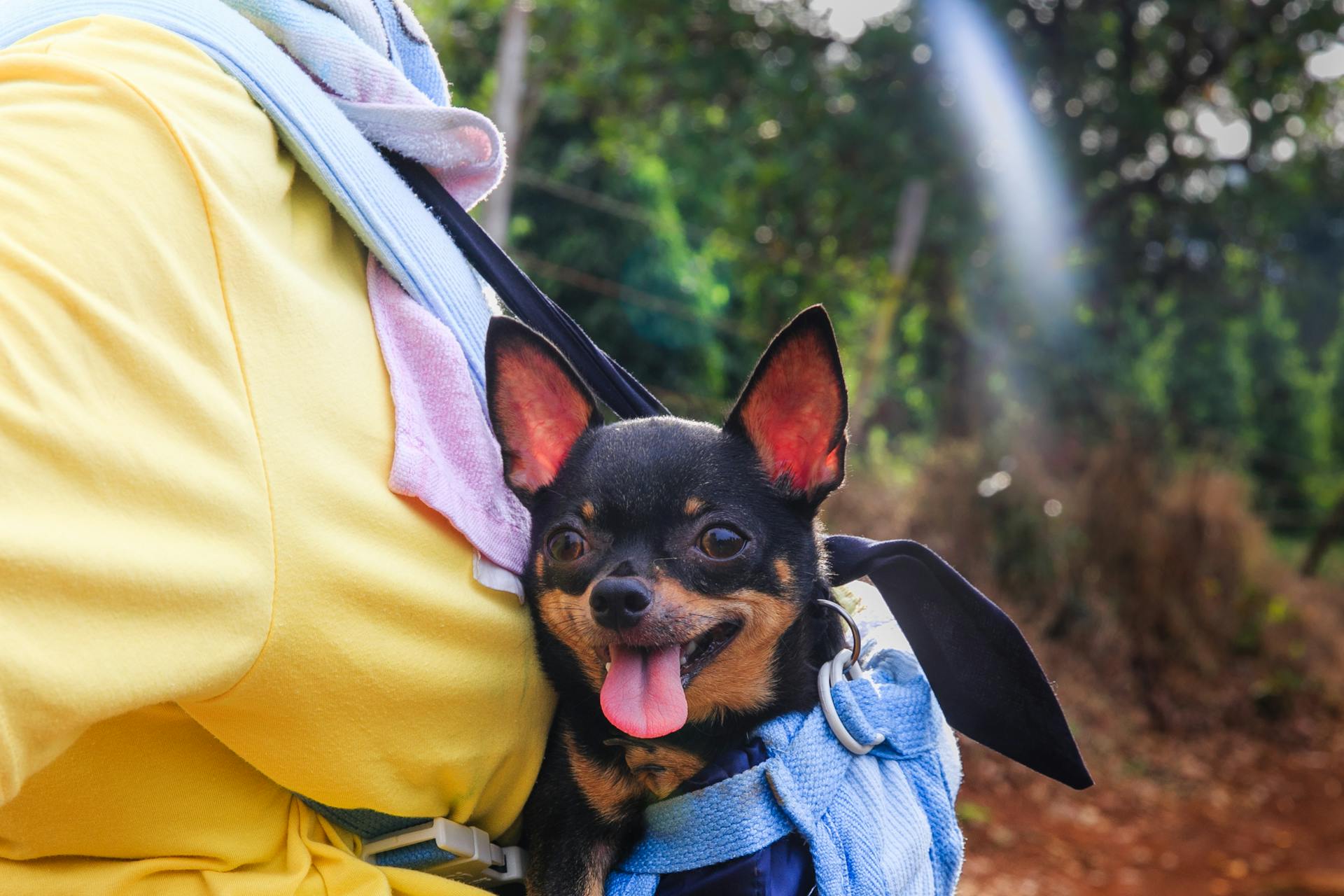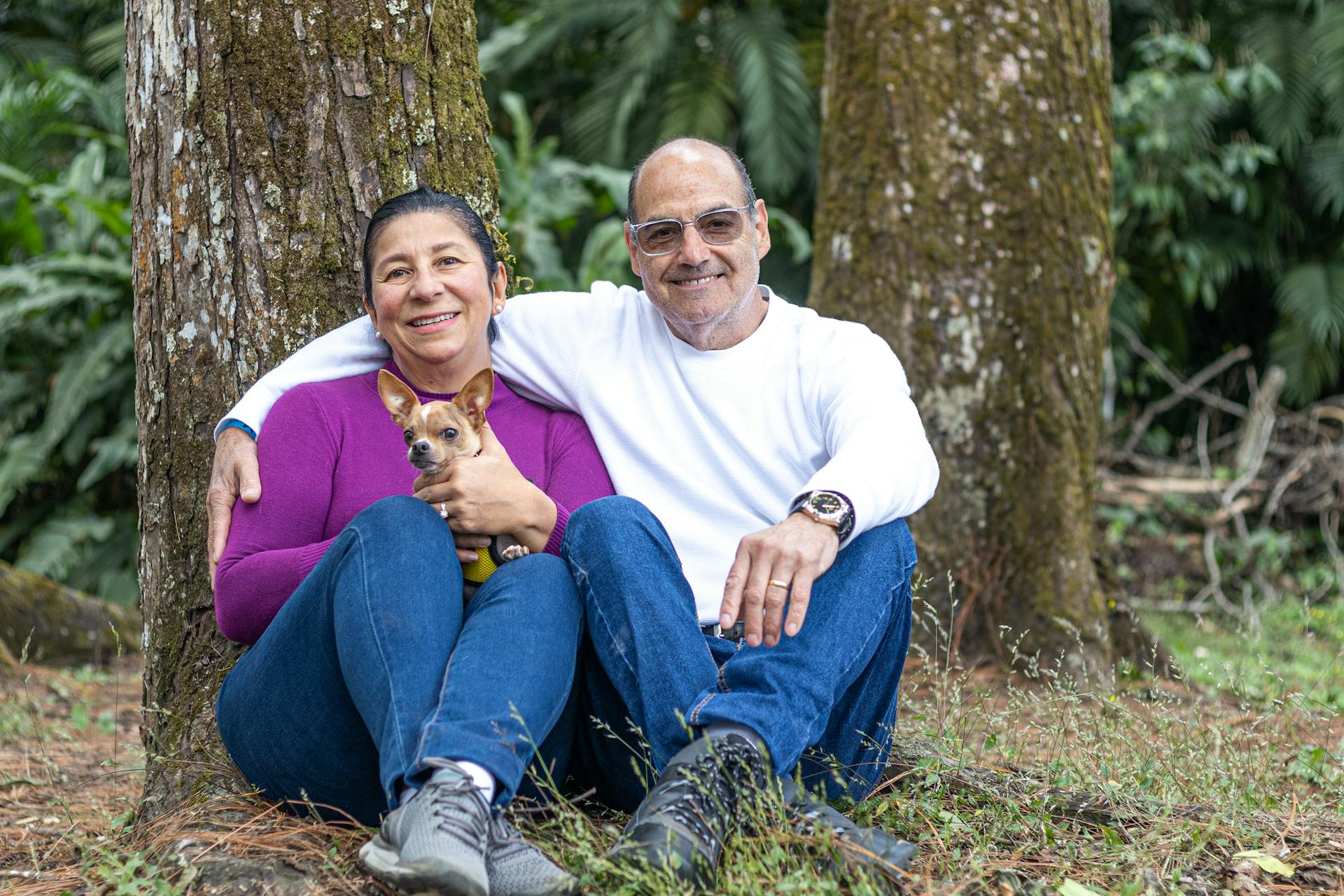
Old Chihuahua dogs can live up to 15-20 years with proper care.
As they age, their dietary needs change, and they require a high-quality senior dog food to maintain their weight and overall health.
Old Chihuahuas are prone to dental problems, so regular brushing and dental check-ups are crucial to prevent tooth loss and gum disease.
Their small size means they can easily become overweight, so monitoring food intake and exercise is essential to keep them at a healthy weight.
Old Chihuahuas may experience cognitive decline, leading to confusion and disorientation, so creating a safe and familiar environment can help alleviate these symptoms.
Their hearing and vision may also decline with age, so regular check-ups with a veterinarian can help monitor these changes and make necessary adjustments to their care.
A comfortable living space, such as a dog bed or orthopedic mattress, can help alleviate joint pain and discomfort in old Chihuahuas.
Here's an interesting read: Small Chihuahuas for Adoption
Health Issues
Old Chihuahuas can live up to 14-16 years, making them one of the longest-living dog breeds. Their longevity is largely due to their small size, which means their hearts don't have to work as hard to keep blood circulating.
Chihuahuas are generally healthy, but like all dogs, they're predisposed to certain medical conditions. One common issue is dental disease, which can be caused by overcrowding or poor oral care. Chihuahuas need regular dental check-ups and proper oral care to prevent this problem.
Some common health issues in old Chihuahuas include heart disease, obesity, and eye problems. Heart disease can lead to congestive heart failure, while obesity can exacerbate other conditions. Eye problems, such as glaucoma, chronic dry eye, and cataracts, can be painful and lead to blindness.
Here are some common signs of heart disease in Chihuahuas:
- Coughing
- Exercise intolerance
- Weakness
- Collapse
- Difficulty breathing
Regular check-ups with your veterinarian can help detect these issues early on, ensuring your old Chihuahua receives the necessary care and attention.
Heart Disease
Heart disease is a serious health issue that can affect Chihuahuas, and it's essential to be aware of the signs and symptoms.
Chihuahuas have a relatively high incidence of heart disease, which can progress to congestive heart failure. This is often related to chronic degenerative mitral valve disease, a condition that weakens the valve on the left side of the heart, causing blood to leak backward.
Take a look at this: How Long Do Pomeranian Chihuahuas Live
Clinical signs of heart disease in Chihuahuas include coughing, exercise intolerance, weakness, collapse, and difficulty breathing.
A heart murmur is often the first indicator of underlying heart disease, and your veterinarian may be able to detect it during an examination.
If your Chihuahua has a patent ductus arteriosus (PDA), a blood-carrying vessel that doesn't close after birth, it may require surgery for appropriate therapy.
Chronic degenerative valve disease is a progressive process that can require lifelong heart medications and frequent monitoring by a cardiologist.
Here are some common signs of heart disease in Chihuahuas:
- Coughing
- Exercise intolerance
- Weakness
- Collapse
- Difficulty breathing
In This Article
Chihuahuas are prone to certain health issues that can affect their quality of life. They can be vulnerable to hypoglycemia due to their small size.
Their tiny stature also makes them susceptible to injuries and fractures. A fall from a short height can be devastating for a Chihuahua.
Long-haired Chihuahuas require regular grooming to prevent matting and tangling of their fur. This can be time-consuming and requires patience.
Those with short coats are relatively low maintenance in terms of grooming.
Curious to learn more? Check out: Dog Grooming
When to See the Vet
If you think your Chihuahua is underweight, it's essential to schedule a check-up with the vet. They might be suffering from an underlying illness that's causing weight loss or failure to thrive.
A high-quality puppy food can help encourage growth in your puppy. You should also ensure they're eating enough to gain weight.
If your Chihuahua appears overweight and it's not due to overfeeding, it's time to visit the vet. They might have developed an underactive thyroid or diabetes, which is rare in young small breeds.
Don't hesitate to contact your veterinarian if you're in any doubt and concerned about your puppy.
Consider reading: Vets Dog Treats
Pet Care
Old chihuahua dogs require daily exercise with walks and indoor playtime to maintain their physical and mental health.
Their small size can make them easily forget how tiny they are, so it's vital for their owners to monitor them closely around other animals and unfamiliar people.
Chihuahuas can be feisty and bark at other people and dogs, so socialization is key.
Their coat care is relatively low-maintenance, but they are average shedders.
Brushing their teeth daily is crucial to prevent dental disease, and should be a top priority in their care routine.
Their small size makes them easy to take with you on trips and errands, but don't let their size fool you - they still need plenty of attention and care.
Grooming and Care
As your old Chihuahua dog ages, their grooming needs may change. They still require daily brushing to prevent matting and tangling, especially for long-haired Chihuahuas.
Regular nail trims are essential to prevent overgrowth, which can be painful for your dog. Get your Chihuahua used to having their toes played with from day one to make nail trimming easier.
Their eyes can get teary, so it's a good idea to wipe them once or twice a week to remove excess tearing or discharge. Long-haired Chihuahuas may require professional grooming to remove hair around their eyes, which can cause irritation.
Chihuahuas are average shedders, but their coat care is relatively low-maintenance. Short-haired Chihuahuas should be brushed about once a week, while long-haired Chihuahuas require more frequent brushing, about two or three times weekly.
Take a look at this: Chihuahua and Maltese Mix Dogs
How Much to Feed
Your veterinarian can help you calculate the daily calories your Chihuahua should eat to avoid weight gain.
Choosing a small-breed food allows for easy chewing and has recommendations for serving sizes.
It's essential to monitor your dog's weight, so you can adjust their food intake accordingly.
A fresh viewpoint: How to Stop Dog from Eating Other Dogs Food
Grooming Guide
Chihuahuas are relatively low-maintenance when it comes to grooming, but they do need regular care to stay clean and healthy.
Short-haired Chihuahuas should be brushed about once a week to control their moderate shedding. Long-haired Chihuahuas require more frequent brushing, about two or three times weekly.
Daily brushing is a must for long-haired Chihuahuas, along with routine de-shedding of the undercoat. This helps prevent matting and tangling.
Chihuahuas might need a bath once or twice a month, depending on how active they are outdoors. This will help keep their coat clean and prevent dirt buildup.
Regular nail trims are a must for Chihuahuas, so get them used to having their toes played with from day one. This will make nail trimming a breeze.
Tear staining is a common issue in Chihuahuas, so it's a good idea to get them used to having their eyes examined and wiped with an eye cleaner as part of their daily routine. Using a lubricating gel can help keep their eyes comfortable.
Discover more: Why Do Chihuahuas Always Shake
Eye Care
Eye Care is crucial for Chihuahuas, as their big eyeballs can get teary, requiring pet parents to wipe them once or twice each week to remove excess tearing or discharge.
Long-haired Chihuahuas may need professional grooming to remove hair around their eyes, which can cause irritation and other issues.
Regular eye care can help prevent problems like redness and tearing, making it easier for your Chihuahua to feel comfortable and relaxed.
Pet parents should be aware of these needs and make eye care a regular part of their Chihuahua's grooming routine.
Readers also liked: Mini Dachshund Mix with Chihuahua
What Affects a Dog's Size?
Genetics play a big part in determining a dog's size, so it's essential to look at the size of your puppy's parents to get an idea of what to expect. If they're small or big, there's a higher chance your puppy will follow their footsteps.
Your puppy's nutrition is another crucial factor, and they need lots of nutrients like protein, calcium, and phosphorus to grow properly. They'll initially get these from their mother's milk and then from high-quality puppy food when they're weaned.

Over-exercising your puppy can affect their growth plates, causing premature closure or abnormal growth, which can affect their height. It's essential to consult with your veterinarian to determine the right amount of exercise for your puppy.
Underlying health conditions that cause your puppy to be unwell can also affect their growth negatively, so make sure to get them checked by your vet if they seem unwell. High parasite burdens can be detrimental to a puppy's development, so keep parasite treatment up to date.
Training and Behavior
Old Chihuahua dogs are incredibly smart and eager to please, but they can also be strong-willed due to their high intelligence.
House training can be more challenging with Chihuahuas than other breeds, so it's essential to be patient and use positive reinforcement. Food rewards are a great motivator, but be mindful of calories!
Chihuahuas love to chew, bite, and play with things, so it's crucial to keep an eye on them at all times. Silence should always be treated with suspicion, as they might be up to something mischievous.
Using a crate can be helpful when toilet training a Chihuahua, but make sure it's the right size – too roomy and they might use one corner as a toilet! A crate that's the size of their bed with space for a small water bowl is ideal.
Chihuahuas are known for their "bitey behavior", which is likely due to their small stature. They also have a tendency to quiver constantly, which could be caused by being cold, low blood sugar, or anatomy issues.
Breed Information
Chihuahuas come in a variety of colors including black, black & tan, blue & tan, chocolate, chocolate & tan, cream, fawn, fawn & white, and red.
They're suitable for families with older children, apartments, and people who want a constant companion.
Chihuahuas are known for being protective, playful, loving, and yappy, making them a loyal and entertaining companion.
Breed Overview
The Chihuahua is a breed that comes in a variety of colors, including black, black & tan, blue & tan, chocolate, chocolate & tan, cream, fawn, fawn & white, and red.
Check this out: Old Black Lab Dog
They can have either a short-haired or long-haired coat, with the smooth coat being the more commonly kept of the two.
Chihuahuas are known for being portable and cuddly, making them a popular choice for frequent travelers and those who want a constant companion.
Their small size also makes them a great fit for families with older children and for apartment living.
Breed History
The Chihuahua breed has a rich and fascinating history that spans centuries. The Mexican state of Chihuahua is often credited as their native land, but some believe they may have originated from Malta or China.
Early depictions of the Chihuahua show a rather rotund version of the dog, known as the Techichi, which was likely bred as a source of food rather than companionship. This practice was a stark contrast to the breed's later reputation as a beloved companion.
The Aztecs' conquest of the Toltec people in the 11th Century marked a significant turning point in the Chihuahua's history. The dogs became more than just a meal, and they started to feature in religious traditions.
For your interest: Different Types of Chihuahuas

The Chihuahua was created by breeding the Techichi with the Xoloitzcuintli (Mexican Hairless Dog) to produce a dog with more refined features. This breeding resulted in a dog that gained popularity as a companion for nobility.
Historians believe that some people sacrificed Chihuahuas to accompany the bodies of deceased nobles to guide them through the afterlife. This practice highlights the breed's special place in Aztec culture.
The breed we know today started to gain the attention of North Americans in the mid-1800s. The Chihuahua was officially recognized as an AKC breed in 1908.
General Information
Old Chihuahua dogs are one of the oldest dog breeds, with a history dating back over 2,000 years to the ancient civilizations of Mexico and South America.
Their original purpose was to be a companion animal, and they were highly valued for their loyalty and affectionate nature.
On average, a Chihuahua weighs between 2-8 pounds and stands between 6-10 inches tall at the shoulder.
Chihuahuas have a short, easy-to-maintain coat that requires minimal grooming.
Despite their small size, Chihuahuas are known for their bold and confident personalities.
They come in a wide range of coat lengths and colors, including short-haired, long-haired, and a variety of colors such as fawn, black, and blue.
Old Chihuahua dogs are generally considered to be a relatively low-maintenance pet, requiring less exercise and training than larger breeds.
Frequently Asked Questions
What age is considered old for a Chihuahua?
For Chihuahuas, 10 years is considered the age when they become seniors, with many veterinarians making this classification based on the dog's health history.
How do you know your Chihuahua is getting old?
Your Chihuahua's age can be indicated by the appearance of a silvery muzzle, typically starting around 5 years old, although some dogs may show grey hairs as early as 1-2 years old
What to expect from a 15 year old Chihuahua?
As a 15-year-old Chihuahua, you can expect gradual mental decline, including disorientation, memory loss, and confusion, which may manifest as difficulty recognizing family members or remembering tricks and commands
Featured Images: pexels.com


